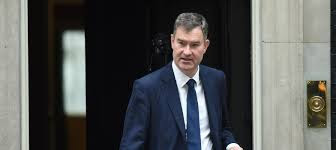 |
| Rory Stewart speaking at the ‘Letters Live’ event |
Johnson kicked him out for the capital offence of opposition to the boss. It’s curious that both parties are now run by men, and by factions, for which loyalty to the leader is now the only test of political reliability: anti-Semites are allowed to remain inside the Labour Party, as long as they demonstrate slavish deference to Jeremy Corbyn. Why, Corbyn even tried to drive Tom Watson, his deputy, out of that position, even though he had been elected to it by the membership, for having had the temerity to oppose his views on Brexit.
Personally, I think it shows real courage to oppose Corbyn’s Brexit views. Indeed, it requires acute powers of observation to discover what they even are, he goes to such lengths to hide them.
Fortunately, Corbyn’s attempts failed, but then he’s not particularly effective. Indeed, the full extent of his achievement in politics, as his supporters never tire of pointing out, is that he did a lot better than expected in the 2017 general election. He didn’t do anything drastic like actually winning, but he lost relatively honourably. A loser who doesn’t do too badly? Yes, that’s probably as high as he can aspire.
Boris, on the other hand, is just as nasty but a lot more effective. So he kicked out 21 Conservative MPs who had the gall to vote against him on 3 September 2019, including Stewart. The 21 have therefore been sitting as Independents in Parliament since then.
Stewart has, however, now gone a step further. He has chosen to leave the Conservative Party altogether and announced he would not stand in the next General Election, ending his Parliamentary career.
He seems reasonably likeable, and I wish him a long and happy retirement, or indeed some new and rewarding career. He has, however, announced that he would not be leaving politics, but would run for Mayor of London. That’s not something in which I can wish him any joy, however, since I think London’s Mayor, Sadiq Khan, is the best politician Labour has and the only way I’d like to see him stop being Mayor is if he returned to Parliament to take over the party leadership.
It will certainly need a figure of his ability to rebuild the party after the Corbynists have finished wrecking it.
No good wishes, then, for Stewart’s run for Mayor. But congratulations, on the other hand, for the way he announced his resignation. He was taking part in an event at the Albert Hall on 3 October. Called ‘Letters Live’, it involves various celebrities reading out letters of historical or other importance. Stewart chose to read out two from Martin Hammond, a housemaster at Eton, the super deluxe public (i.e. private) school both Stewart and Boris Johnson attended. They were addressed to Stanley Johnson, Boris’s father. One pointed out:
Boris sometimes seems affronted when criticised for what amounts to a gross failure of responsibility (and surprised at the same time that he was not appointed Captain of the School for next half). I think he honestly believes that it is churlish of us not to regard him as an exception, one who should be free of the network of obligation which binds everyone else.
 |
| The letter about Boris Johnson, first made public by a Letters of Note tweet |
Indeed, that prorogation has been found to be illegal, so it’s clear he feels the law itself needn’t constrain him.
Nothing has changed. He felt entitled to whatever he desired back in 1982, he feels the same entitlement today. His character was fixed then. All that has changed since is that he now has far more power to inflict his wishes on others.
It’s another point on which Johnson and Corbyn resemble each other. The Labour leader, too, is convinced that entry to 10 Downing Street is now his entitlement, and (so far) refuses to stand aside for anyone else, even if that’s the only way of getting Boris out. To our sorrow, it seems Britain is going through an era of entitled leaders.
But, again, Boris is a lot more effective. And therefore a great deal more dangerous.





